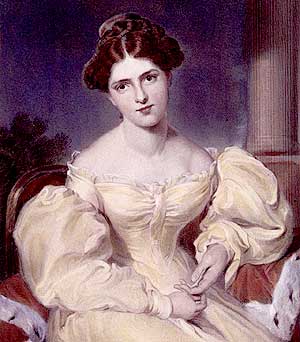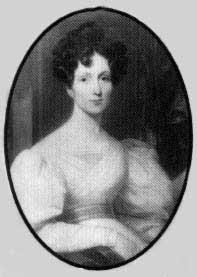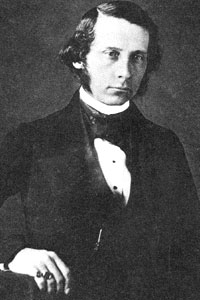|
The
Wedding
Her
dress is perfect.
Her ring is perfect.
Her husband is perfect.
The families are perfect,
the laughter and cheers and toasts,
and they dance for hours,
she careens this way and that,
high on champagne
and wild reckless love,
and, later, she'll think joyfully
that this was the best day of her life,
and, later, she'll think mournfully
that this was the best day of her life.
|
|
 |
TOP
OF PAGE
The
Silence
Like weeds
they seem
to sprout, his wife's ideas,
her lecturing him, which began
hesitantly, but lately
grows to shrillness about
God's children and
abominable practices and
the rights of man, and
Pierce Butler of America
has never heard such words
from the mouth of a woman, and
it's shocking, this pathetic
attempt of the female mind
to grasp what is so patently
beyond it, and he tries to be
calm, to placate her, divert
her attentions to pretty things
more suited to her sex. She'll
have none of it, angry words
flying from Fanny the righteous,
Fanny the pure of heart,
until one evening, exasperated
beyond human endurance,
he makes the simple point,
in simple, polite language, that
as his wife she is herself
one of the largest slaveowners
in the state of Georgia, and this,
at last, silences her, leaves her eyes
wide and throat pulsing, and though
he knows he shouldn't, he
allows himself a small sense
of victory when he walks past
her room later, hears the weeping
on the other side of the closed door.
TOP
OF PAGE
Learning
the Language
As a boy
Jack would use many words,
and sometimes they earned him
a harsh rebuke in return, a slap across
the face, the lash itself over his back
and shoulders, and so he learned to speak,
to remove the bad and stupid language
like why and stop and wrong
and replace it with just one word, a word
that was always the right word,
and so to the Major he says Yes,
and to the Missis he says Yes,
and to their children he says Yes,
and to the overseer he says Yes,
and to every white person he sees
on God's Earth he says Yes, and it's
a beautiful and harmonious world
of Yes which he says again and again,
even in his sleep, to smother the No
that lurks always at the base
of his spine, hot, acidic, ready to spring.
TOP
OF PAGE
Triumph:
A Definition
Over crabs
and wine, their friend Sidney George Fisher
tells Fanny of a master he'd known in Alabama
who'd dressed a favorite slave up in motley,
cap-and-bells, red pantaloons, and paraded him about
wherever he went, pulled along by a leash and
rhinestone-studded collar. This slave, Obediah by name,
would sing, dance with considerable agility, and perform
simple magic tricks, for which he would be rewarded
with small candies which the master kept in his pocket
and which Obediah would catch from mid-air in his mouth.
When Fanny comments about the sorry humiliation of
it all, Fisher tells her, looking thoughtfully through the window
at the glistening blacks in the ricefields down the hill,
that Obediah, who never lived a day out of the collar
until his last years, sired fourteen sons, celebrated countless
grand- and great-grandchildren, and died at the age
of ninety-six, in a featherbed big enough for three.
TOP
OF PAGE
|


|
|
Hearing
Stories
She
wants to hear it, hear it all,
and so Jack tells it, tells it all,
about Glasgow's whipping, the tying
his arms around the old oak, his feet
left on tiptoes, just touching the ground,
and the overseer's fat leather strap,
how the wounds opened after three
strokes, how you could see blood
spattering from the lash after five,
and his screaming...She says to go on,
go on, Jack, and he tells her how they
all watched and listened, the overseer's
arms pumping regularly as a cotton gin,
as Glasgow's screaming faded to
gasping, then croaking, then nothing,
and his eyes rolled back in his head,
and that was all...And she says to go on,
go on, Jack, and he tells her how
they untied the carcass then, how
the overseer raised a rusty can
over Glasgow, opened it, poured
rock salt over the blood-drenched
wounds and demanded that House Molly
get down on her knees, rub the salt in
good and strong, and as she did it he
came awake, oh! yes, a wet moan
rattling in his throat...And she says to go on,
go on, Jack, and he starts to laugh,
he can't help himself, he laughs,
looking at the pretty white lady next to him
in the boat, at her intently glistening eyes
and sweat-soaked white skin,
and she asks him, suddenly, through
his merriment, Jack, why are you laughing?
and he can hardly gasp an answer, which
isn't the right answer, as he says,
I don't know, Missis, I guess there was
just somethin' funny about it, and she
studies him curiously, tensely,
as she says, suddenly, like
a thunderbolt in a clear sky, Jack, tell me
the truth, would you like to be free?
He stops laughing then, stops completely,
and there is a silence between them-until
he explodes again, great whoops and guffaws,
and the whole world is funny to him at that
moment, the boat, the river, the white lady,
poor bloody Glasgow, and the question,
the funniest of all, hilarious, breathtaking!
|
TOP
OF PAGE
Patrimony
Once, as
she writes in her room by dim candlelight,
she glances up and sees Sarah in the doorway, smiles
and calls her Bumpkins, as she always does, invites her
in, but the figure doesn't move, says only, Missis?
And, looking again, she realizes that it's a slavegirl
named Josephine, not Sarah at all, yet for a slanting instant
she'd been sure, positive, and as she looks now
she sees something she's never, somehow, quite seen,
that Josephine does look rather like an evening-hued
molding of Sarah, Sarah with her high cheekbones
and round dark eyes, Sarah who has always been
the mirror's very image of Pierce Butler, her father.
TOP
OF PAGE
|